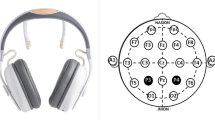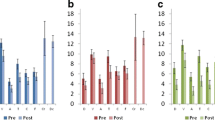Abstract
Success or failure of EEG feedback training for alpha enhancement can depend on how alpha activity is quantified and fed back. Alpha-enhancement failures usually employ a percent time(%) technique; successes typically use amplitude integration(ε). To dramatize the differences between percent and integration techniques, we derived both measures simultaneously from left occipital(O 1 ) and left central(C 3 ) sites for 16 male subjects who were given 5.6 hours of integrated alpha feedback from the midline occipital(Oz ) site. At both the O 1 and C 3 sites the integrated and percent measures were not equivalent and not linearly related. Statistically significant differences in the(integrated, percent) correlation coefficients(z-transformed) were observed under the different recording conditions: alpha enhancement, alpha enhancement, alpha suppression, and baselines. Theoretical discussion of integration and percent techniques is given and the adoption of amplitude integration measures and feedback stimuli is strongly advocated.
Similar content being viewed by others
References
Anand, B. K., Chhina, G. S., & Singh, B. Some aspects of electroencephalographic studies in Yogis.Electroencephalography and Clinical Neurophysiology 1961,13 452–456.
Banquet, J. P. Spectral analysis of the EEG in meditation.Electroencephalography and Clinical Neurophysiology 1973,35 143–151.
Brown, B. B. Recognition of aspects of consciousness through association with EEG alpha activity represented by a light signal.Psychophysiology 1970,6 442–452.
Cleeland, C. S., Booker, H. E., & Hosokawa, K. Alpha enhancement: Due to feedback or the nature of the task?Psychophysiology 1971,8 262–263.
Engstrom, D. R., London, P., & Hart, J. T. Hypnotic susceptibility increased by EEG alpha training.Nature 1970,227 1261–1262.
Etevenon, P., Henrotte, J. G., & Verdeaux, G. Approche methodologique de états de conscience modifiés volontairement.Revue E. E. G., Paris 1972,3 232–237.
Gannon, L., & Sternbach, R. A. Alpha enhancement as a treatment for pain: A case study.Behavior Therapy and Experimental Psychiatry 1971,2 209–213.
Hardt, J. V. Alpha EEG responses of low and high anxiety males to respiration and relaxation training and to auditory feedback of occipital alpha.Dissertation Abstracts, International, 1974,35(4), Catalog No. 74-19309.
Hirai, T.Psychophysiology of Zen, Tokyo: Igaku Shoin, 1974.
Honorton, C., Davidson, R., & Bindler, P. Shifts in subjective state associated with feedback-augmented EEG alpha.Psychophysiology 1972,9 269–270.
Hord, D., & Barber, J. Alpha control: Effectiveness of two kinds of feedback.Psychonomic Science 1971,25 151–154.
Kamiya, J. Self regulation as an aid to human effectiveness. Progress report on Office of Naval Research Contract No. N0014-70-C-0350, Washington, D.C.: May 15, 1971.
Mulholland, T. B. Can you really turn on with alpha?The R.M. Bucke Memorial Society Newsletter Review 1972,5(1&2), 32–40.
Paskewitz, D. A., & Orne, M. T. The effect of cognitive tasks on the feedback control of alpha activity.Psychophysiology 1971,8 263.
Paskewitz, D. A., & Orne, M. T. Visual effects on alpha feedback training.Science 1973,181 360–363.
Peper, E., & Mulholland, T. B. Methodological and theoretical problems in the voluntary control of electroencephalographic occipital alpha by the subject. InBiofeedback and Self-Control 1970. Chicago: Aldine-Atherton, 1971.
Podlesney, J. A., & Raskin, D. C. Biofeedback: A failure to enhance alpha EEG.Proceedings of the Society for Psychophysiological Research, Galveston, October 1973.
Travis, T. A., Kondo, C. Y., & Knott, J. R. Alpha conditioning: A controlled study.The Journal of Nervous and Mental Disease 1974,158 163–173. (a)
Travis, T. A., Kondo, C. Y., & Knott, J. R. Personality variables and alpha enhancement: A correlative study.British Journal of Psychiatry 1974,124 542–544. (b)
Travis, T. A., Kondo, C. Y., & Knott, J. R. Parameters of eyes-closed alpha enhancement.Psychophysiology 1974,11 674–681. (c)
Walsh, D. H. Effects of instructional set, reinforcement and individual differences in EEG alpha feedback training.Proceedings of the Biofeedback Research Society, Boston, November 1972.
Walsh, D. H. Interactive effects of alpha feedback and instructional set on subjective state.Psychophysiology 1974,11 428–435.
Author information
Authors and Affiliations
Additional information
This study was supported by the following grants and contracts: National Institute of Mental Health (NIMH) Predoctoral Fellowship #1 F01 MH51704-01, NIMH General Research Support Grant #LPNI 185, and a Langley Porter Neuropsychiatric Institute Postdoctoral Fellowship (Interdisciplinary Training Program, NIMH #7082) to James V. Hardt, and by NIMH Research Scientist Development Award 2K02 MH38897, NIMH Research Grant #1 R01 MH24820, Office of Naval Research (ARPA) Contract N00014-70-C-0350, and Instruction and Research Funds, Computer Center Accounts (UCSF) #1431 and #1437 to Joe Kamiya.
Rights and permissions
About this article
Cite this article
Hardt, J.V., Kamiya, J. Conflicting results in EEG alpha feedback studies. Biofeedback and Self-Regulation 1, 63–75 (1976). https://doi.org/10.1007/BF00998691
Received:
Issue Date:
DOI: https://doi.org/10.1007/BF00998691




